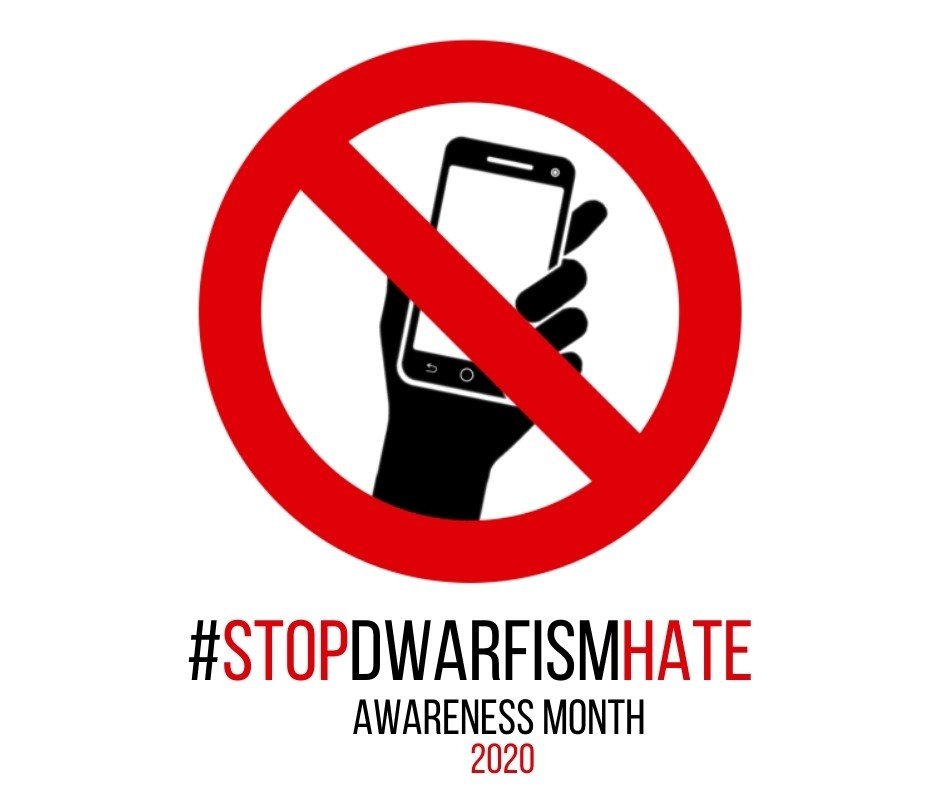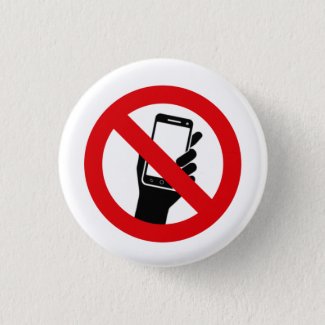Post contents
- Abusive behaviour has not changed in 15 years – it’s worse! »
- The first time a non-disabled person tried to photograph me without consent »
- Devastating Impact »
- A picture paints a thousand words »
- Aiming to Empower The Dwarfism Community »
- How to support #StopDwarfismHate as an ally »
- #StopDwarfismHate – The Branding
- Aims of the #StopDwarfismHate campaign »
- What you can do now »
- Moving forward »
Video description:
An animated video that shows the following text flowing in from the left:
- 96% have experienced staring or pointing.
- 77% have been on the receiving end of verbal abuse.
- 75% feel they often attract unwanted attention.
- 63% of respondents have often felt unsafe when out.
- 33% have been physically touched by people in public.
- 12% have experienced physical violence.
Followed by the Stop Hate Dwarfism graphic showing a hand holding a phone at an angle with a red stop circle sign over the top with the hashtag #StopDwarfismHate – Dwarfism Awareness Month 2020.
These figures were found in the academic paper – Shakespeare, T., Thompson, S. and Wright, M., 2010. No laughing matter: medical and social experiences of restricted growth. Scandinavian Journal of Disability Research, 12(1), pp.19–31. DOI: http://doi.org/10.1080/15017410902909118
Abusive behaviour has not changed in 15 years – it’s worse!
The statistics above reflect the types of prejudice and abuse that people with Dwarfism face. While the research was undertaken nearly 15 years ago, observations from chatting with people in the community show that the reactions to our bodies have not changed.
With the proliferation of the camera phone, especially within the past decade, the objectification of our bodies, I suspect, has increased the negative attention and abusive behaviour towards our bodies ten-fold.
Yet… our experiences, the bullying, the point and staring, the negative attention, being photographed does not garner the outrage, empathy, let alone support and understanding from the general public. We’re more likely to be laughed at and laughed down.
Whether sat on a bus, walking through a busy high street or sat in a cafe attempting to enjoy a family meal – Dwarf people are constantly on edge wondering if they are going to be made into the next meme or butt of the joke while going about our everyday lives.
In a society where height is equated to and representative of apparent status, we are prime targets for politicians, people on the street, and comedians. Whether this on the live circuit of entertainment, on-screen, on the street, our bodies are objectified for other peoples’ amusement… and this treatment stems back centuries.
The first time a non-disabled person tried to photograph me without consent
I’ll never forget the first time it happened to me.
I was walking down Oxford Street in London one evening with a lady who had another form of Dwarfism.
We’d been to see Abnormally Funny People in Soho and we’re catching the bus back. The lady clocked this young man (it’s always men) walking with his girlfriend, slowing down, mobile phone camera out and angled.
She confronted him first, I traumatised at the realisation of what happened, asking ‘why would you do that?!?’
He denied it, of course, they always do. You’re being crazy, they say. but the cruel laughter in their knowing eyes and smirk always gives them away. The girlfriend sharp kept her distance.
I arrived back at my accommodation shaken. Besides myself from the violation. Violation of privacy, the violation that my body was being recorded for someone else’s amusement.
Where would a photo like that go you wonder – staring at the cup of tea that’s not calming the nerves. Thank goodness for my best friend who talked me down that night.
I’d like to say it was an isolated experience. Yet there have been uncomfortable moments when I’ve wondered if someone is pointing their phone at me. One time, I was sat having a meal with my husband and young daughter.
Increasingly over the last 10 years, time and time again, I see and hear people from the Dwarfism community talking about non-disabled people hanging attempting to take photographs of our bodies for their own gratification and amusement. At the extreme hanging out of car windows shouting the highly offensive term ‘midget’ while pointing their camera phones to have a laugh with their mates fun.
Devastating Impact
We have no idea what, where or how that image will be used or published. The impact of such despicable behaviour can be devastating for a person with Dwarfism and their families.
You see, when an average height, non-disabled person walks down the street, they have relative anonymity and safety.
Dwarf people aren’t afford such privilege – whether that is being gawped at or at the extreme being photographed or experiencing physical abuse.
That one photograph can lead to further mocking. Such behaviour can cause members from our community to further isolate and withdraw from society for our own personal safety and wellbeing.
The cumulative effect of a million micro-aggressions and overt abuse, such as being photographed and mocked online can also lead to depression and suicide.
A picture paints a thousand words
Yet, people like myself, who are activists in raising awareness of the societal impacts on living with Dwarfism, can write pages and pages about the prejudicial attitudes we face – but it doesn’t always impact.
As the exhibition ‘You’re Just Little’ showed, a picture paints a thousand words. Visual representations of experiences always have the most impact and brings home the stark difficulties that we face.
This is the idea behind #StopDwarfismHate. A graphic image of a hand holding a phone under a stop sign – says all it needs to – Stop photographing our bodies!
Aiming to Empower The Dwarfism Community
The banner and pin badge are designed to empower Dwarf People to visually make a statement that attempting to photograph us, ‘just for a laugh’ with your mates has far more impact than that single action of a photo.
Without saying a word we can say – stop photographing our bodies!
At the very least, I hope that the sign starts much-needed conversations with people who can be our allies.
You can find out how to add this branding to your own social media – and get the pin badge, below!
How to support #StopDwarfismHate as an ally
People that know us are often appalled that incidents like this happen to us. There are many that still need to be made aware that this behaviour is wrong.
I’m not going to mince my words, if it wasn’t for this blog and platform I’m not convinced that I would be here because of the many things that I have experienced because of my dwarfism.
And while I can create initiatives like this to deal with my own trauma… we need the general population to start speaking up, stepping in and taking responsibility for the way dwarf people are being treated daily.
If you want to be an ally…
- Share this post and talk about why it’s wrong to take photos of someone because of the way they were born.
- Challenge comedians and poor representation of our disability through arts, culture and especially the media.
- If you’re an editor, producer or publisher – how can you ensure your talent do not include offensive material in their work.
- Use the frame below on your social media profiles.
- Intervene with caution when you see a Dwarf person being abused – report incidents to the police.
#StopDwarfismHate – The Branding
Facebook Profile Frame
You can add the #StopDwarfismHate frame on your profile photograph on Facebook.
To do this:
- Click on your Profile Image
- Select Add Frame from the menu
- Search for #StopDwarfismHate or search for HelloLittleLady
- Select the frame you want to add to your profile photo
- Click Done.
Get the Pin Badge
Whether you’re a Dwarf person who wants to stop the idiots from taking your photograph without the confrontation or an ally who wants to support the campaign – order your pin badge here and wear with pride! You can buy yours from my shop on Zazzle!
Aims of the #StopDwarfismHate campaign
The aim for the #StopDwarfismHate is to:
- Help the Dwarfism community feel empowered by silently stating – do not photo me!
- Bring awareness and to stop our lived experiences being objectified and used for amusement throughout all sections of society.
- To start a discussion around the issues people with Dwarfism face daily.
What you can do now
While I’m not naive in thinking that one campaign will change the perception and treatment of how our society treats our community, my hope is that #StopDwarfismHate will go some way to giving a voice and confidence to our community to speak out.
So, if you’re wondering what to do next, here are a few things you can do to help:
-
- Share and talk about this blog post!
- Add the Facebook Frame to your Profile image
- Buy the pin badge!
- Sign-up to the Hello, Little Lady mailing list for the latest updates of this campaign and other workshops.
Moving forwards
I look back at the research cited above and wonder if it was conducted again, what the statistics would be like today? Would there be a measurement of the serious impact on our mental health? How can we use this information to enable our community to start speaking confidently about the prejudice we face?
It’s part of a wider inside and outside of the community effort – no doubt. But for now, wear the pin badge, use the Profile photo frame, let’s get the conversation started.


